
*
After nearly three decades, the beloved 1983 film "A Christmas Story" has danced its way to Broadway this season in a new stage musical adaptation that is kicking up a leg-lamp chorus line at the Lunt-Fontanne Theatre for the holidays, now to Dec. 30.
The songwriting team of Benj Pasek and Justin Paul, along with book writer Joseph Robinette, transformed the classic Jean Shepherd story for the stage. The writers have also been given some sage advice and guidance by the film's original star, Peter Billingsley. On screen, he originated the role of the bespectacled Ralphie who longs for an "Official Red Ryder Carbine-Action Two-Hundred-Shot Range Model Air Rifle!" He is now among the lead producers of the Broadway production.
An accomplished Hollywood producer of such films as "Iron Man," "The Break-Up," and director of "Couples Retreat," Billingsley took a moment to speak with Playbill.com and look back at "A Christmas Story" past and A Christmas Story present.
You were pretty young when you did the original film. What do you recall about the experience?
Peter Billingsley: I had been acting for a long time. I started when I was two-and-a-half and I was about 12 when I did the movie. I had been a part of some pretty big-budget flops prior to that. When you're involved in those big-budget movies there's a lot of hype, "Oh this is gonna be a big hit!" And "A Christmas Story" wasn't. It came and went and was a big disappointment at the box office. I think the difference with this movie, that I sensed right away, was everyone's approach to the work. In many ways it was the little engine that could. It took about 12 years to get made. [Director] Bob Clark and Jean Shepherd fought so hard to get it set up, and MGM sort of reluctantly agreed to the financing. So, it was really...devotion to the work and not to the hype. Which was refreshing.
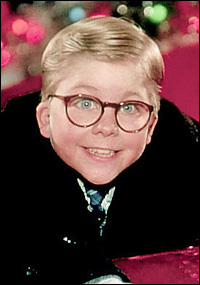 |
||
| Peter Billingsley as "Ralphie" |
||
| MGM |
But you can never say, "Oh we sure knew." Everybody believed in it and was having a good time doing it and liked the story. It was also done in a time before cable and video were really popular, so when it came out in theatres, it did okay at the box office based on what it cost but you sorta thought, "Well, that was fun, it was good, got some good reviews and maybe did okay at the box office and that's it." But then as cable and video were booming it just kept coming back and returning as a seasonal title. People discovered it and I think the relatability of the story helped.
Even though it's set in the 1940s and from a part of the country people might not be from, there's something very real about that portrayal of a family that was different than the more traditional vanilla kind of family that we were normally hit with. The dad's got a bad temper, the mom seems a bit kind of aloof at times. There's something very, very real about that family and ultimately very loving about that family. We all have our own kind of dysfunctions. In many ways I think it was really this sort of commitment to the mundane that makes it special. It's those simple relatable things of picking up a Christmas tree, wanting something for Christmas, going to visit Santa.
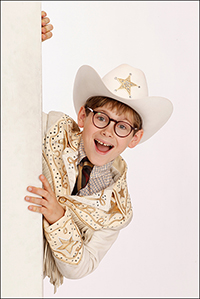 |
||
| Johnny Rabe plays Ralphie on Broadway |
||
| Photo by Carol Rosegg |
PB: I felt very close to the material. I've been asked or approached in the past about adaptations. When something is as successful or big as a brand, people really want to do things. I didn't have any interest and hadn't had any interest. I know there's something they're calling the sequel and I don't know how, considering that the two filmmakers are dead. So, I don't know how in any way it's the official sequel, but anyway, perhaps it is. I haven't seen it and I don't intend to.
The idea of a musical was very, very inspiring to me because it's really an extension of the story. I don't think you want to remake the story. They did a pretty good job the first go-round. But Ralphie was very much a dreamer in the film. So many of those fantasy sequences lend themselves so well to the big Broadway song-and-dance pieces. And that's really what it is. When the dad wins the leg lamp, it turns into a leg-lamp kick line.
The musical takes all those great moments of excitement and blows them out into larger levels. So, that was the first time I was really inspired to do anything with it. Fans are protective of the title and of the brand. Probably moreseo than me. For them it's a tradition, it's something they watch. So, for them, it works and I don't think they need anything else on the big or small screen that really represents that. But the response has been overwhelmingly positive for fans who have seen the musical because... it carefully reminds them of what they loved in the film. It has all the set pieces in there that they want to see, there's the tongue that gets stuck on the pole, the leg lamp, but they're presented in a really fun musical ensemble/dance way. It's very much a complementary piece. We hope it becomes a tradition much like the film. Going to this musical will be a tradition for families.
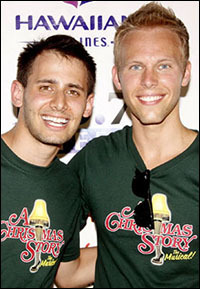 |
||
| Benj Pasek and Justin Paul |
||
| photo by Joseph Marzullo/WENN |
PB: I think you always win in storytelling when you let the best creative ideas guide you. These guys submitted some songs to us that were the most inspired music we had heard from anybody. You're right, you could look and think there's somewhat of an inexperience of an age, but when you spend time with Benj and Justin, they make you feel so comfortable. They're so smart, they're so connected with the story, and with the intentions, and they're so talented. There might have been a moment where we said, "You know these guys are young," but you know what, that's wonderful. Their energy and their point of view has helped give this piece an energy and a youthful point of view. But their songs are also sophisticated, and they're fun, and they're interesting, and they're satisfying. You don't want to outthink yourself. They flat-out earned it. They did the best songs, they did the best job, and they were clearly the right fit for it. At the end of the day it was an easy decision. It was so clear how bright of a future they were going to have. They're going to have a really long and prosperous career, so the truth is we feel lucky to have them. We're glad they wanted to collaborate with us.
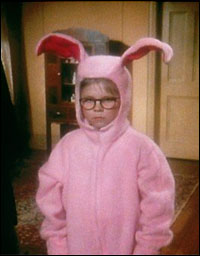 |
||
| Billingsley in "A Christmas Story." |
||
| MGM |
PB: It's two-fold. I stopped acting a long time ago and my primary career has been producing-directing film. So storytelling is something I've been doing now for a long time. On this film, I do understand it, I lived with it. I spent a lot of time with Bob Clark after the film. We did the commentary on the 20th anniversary on the DVD release. I think I understand the intentions and the points of view of the characters very well. So, as we're going through and adapting this to the musical format, we're staying very true to that, because you don't want to change too much. You can change dialogue — obviously they're now singing — but you don't want to change their point of view, or their intention. I think that's what audiences responded to and that's what they like. So, what's exciting is saying, "Okay, how do we [explore] the intention that the dad feels a lack of respect, and how the lamp presents the opportunity to be recognized, like so many people want to be." The boys wrote two wonderful songs, "Genius On Clevelend Street" and "Major Award," that have that yearning, and that want, and then the ultimate satisfaction of getting it.
This is your first foray into Broadway. Are a musical fan?
PB: This is the first musical that I've produced. I've always been a fan of musicals; you go and you're wowed by the performers. With A Christmas Story, a major percentage of its cast is under 13 or under. And I'm blown away by the amount of talent that I never had and don't have at all in singing and dancing. It's really mind boggling. Inherently, the characters become something different than they were in the film. The role of Ralphie, which is singing and dancing and acting, really transcends past the role that I played. It requires skills that I never have and will never have. These little guys have to go out and do two straight hours of this thing. They don't get a "take two" or a "cut," or say, "I'm tired I wanna go take a nap." You gotta play through night after night after night. Their stamina is amazing.
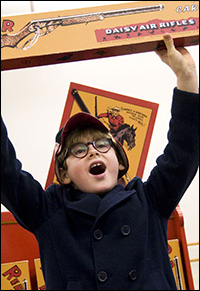 |
||
| Johnny Rabe performs at a press preview for A Christmas Story, The Musical. |
||
| photo by Monica Simoes |
PB: I had an on-set relationship with him. Jean was very passionate about it. When our director Bob Clark would go to the restroom, Jean would run over and say, "No, say it like this!," and then Bob would come back and scream, "Get away from my actor!" It was wonderful, actually, because they both cared so much. That's where it came from, and they just cared so much, and they wanted it to be right. And God bless them, they tried for so long to get that movie made, and it was just clawing, and scratching their way to just get a small budget, $5 million, which is not a lot of money to make a film. I have very fond memories of Jean as being someone who had very strong point of view on life and how things worked.
I imagine you must really carry Jean's spirit with you as you work on this.
PB: I do. It's another big aspect. There was something so unique and special about the tone that Jean created in his personal writings, and also that he and Bob created in the script. The narration was a style that had never been used before. If you watch it, I don't have a lot of lines in the film. Bob read the narration off camera. So much of it is just my face. So, he would read the narration off screen to just get reactions from things. It was definitely a different process, but clearly something was done right.
I've heard it referred to in movie-structure books as truly its own genre. It's first-person, yet looking back — present, as though it's in the head of the character in the past. It was very important to the piece. I think our book writer on the musical, Joseph Robinette, did an unbelivable job of writing the narration and the dialogue, some lines of which are lifted from the movie, but a lot of it can't be. Because the musical is pushing you around the stage in a different way, and the narration is used as a vehicle for other purposes. Tonally, he did a great job of replicating Jean: the tone, the cadence, the word choices. Instead of having the voice of God, the narrator is part of a radio show that he's doing. So this is the voice coming from a radio show and the narrator is on stage. He moves around but the characters don't see him. There's an active presence. Also, we couldn't be more excited to have Dan Lauria play the role. He has so many of the qualities. You get a visual representation of Ralphie grown up, which I think is a very cool thing. You get to see that connection to the family. It's an extension of the film and it takes it to places that the stage allows you to.










